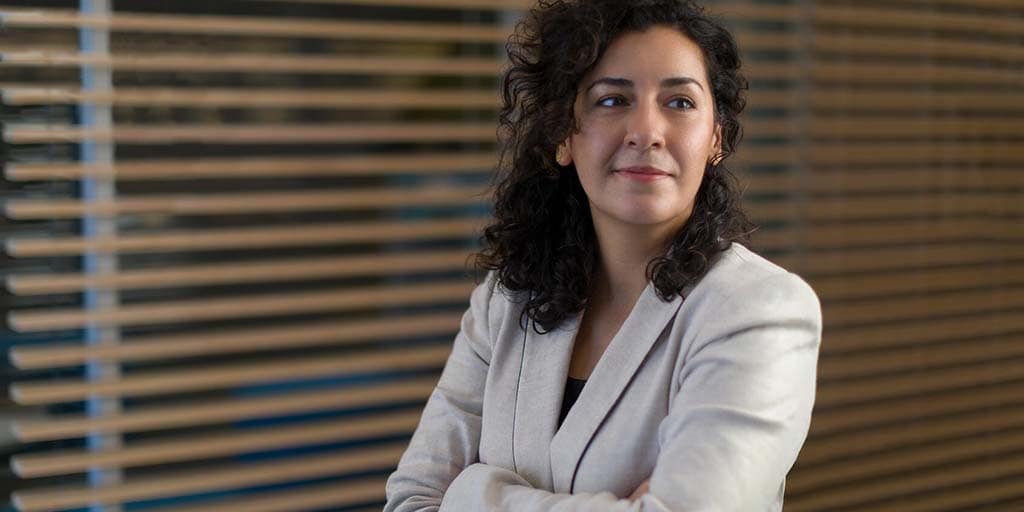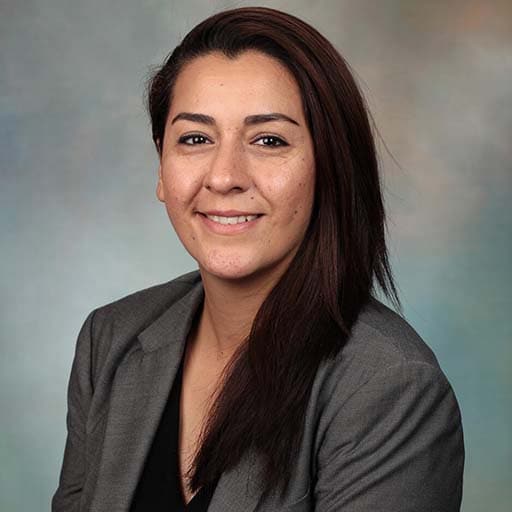
January 18, 2022
Sara Ranjbar, Ph.D., originally from Iran, was taught to not speak up, challenge others, or ask too many questions. As a graduate of a top engineering school in Iran and working to implement a surgical navigation system for skull-based surgeries, Dr. Ranjbar concluded that cultural constraint stood in the way of fast-paced science. Overcoming this cultural burden has made her receipt of the 2021 Mayo Clinic Alumni Association Edward C. Kendall Award for Meritorious Research even sweeter.
“In Iran, I was painfully aware that I had ideas to contribute, and not speaking up was impeding my progress,” she says. “Every time I didn’t speak up, I felt bad and ended up in a negative confidence loop. I was stuck and had a vague sense of being lost and invisible. I needed to be brave enough to proceed in a different way.”
A different way
Dr. Ranjbar moved to the U.S. in 2012 and enrolled in the Ph.D. program at Arizona State University. Her thesis showed that using quantitative image analysis and machine learning can help improve the specificity of breast cancer diagnosis, predict HPV status in head and neck tumors, differentiate benign and malignant head and neck tumors, and stage cognitive decline in Alzheimer’s disease.
In 2018 she joined the Mathematical Neuro-Oncology Laboratory at Mayo Clinic in Arizona to train in neuroimaging and neuro-oncology under the supervision of Kristin Swanson, Ph.D., Department of Neurologic Surgery and the Vasek and Anna Maria Polak Professor of Cancer Research, who has built a career around designing mathematical approaches for personalized glioblastoma (GBM) treatment. While artificial intelligence (AI) is male-dominated, Dr. Swanson’s lab is not.

It’s the first time I’ve had a woman mentor and majority women group. Seeing how women support each other, present research in a convincing way, and speak up freely has helped me do the same and take more leadership roles. I recently agreed to present at four conferences without feeling nervous about it. I don’t feel stuck anymore.
Sara Ranjbar, Ph.D.
Research fellow, Mathematical Neuro-Oncology Laboratory
Dr. Swanson says it’s common for women scientists to be reluctant to speak up. "As a woman leader at Mayo Clinic, I create a culture where everyone is emboldened to speak and know their voice is valuable and heard. Dr. Ranjbar has had a remarkable path and demonstrated resilience while excelling in her pursuit of a career in science."
A sweet reward
"I’m so honored and happy that Mayo Clinic sees value in my research," Dr. Ranjbar says. "I’m a first-generation college student, and my mom is so excited. When I was young and she figured out that I was good at math, she encouraged me. She’s my biggest supporter; I’m pretty sure she’s telling everyone she knows in Iran about the Kendall Award."
Dr. Ranjbar’s work with GBM focuses on MRI-based machine learning models. She has built models that characterize MRI types, extract brain tissue from MRI, outline tumor extent, identify cystic GBMs, estimate missing MRI images for patients, and noninvasively predict tissue heterogeneity across entire tumors. Her efforts have resulted in two accepted first-author papers, another submitted and another in preparation; two first-author, two second-author and five co-author published abstracts; and one co-author paper submitted and one in preparation. Her long-term goal is to be a scientific leader working at the cross-section of imaging and AI at a high-profile research institute.
Dr. Ranjbar is an exceptionally intuitive researcher. She has a natural gift for analytical insights. Rather than just plot out data, she peels away the layers of noise and picks out the important part that will be useful to the patient. This is a rare quality. In 20 years of mentoring students, I find her to be one of the most persistent and effective researchers I have trained.
Kristin Swanson, Ph.D.
Vasek and Anna Maria Polak Professor of Cancer Research
.jpg)
A version of this article originally appeared in Mayo Clinic Alumni Magazine.